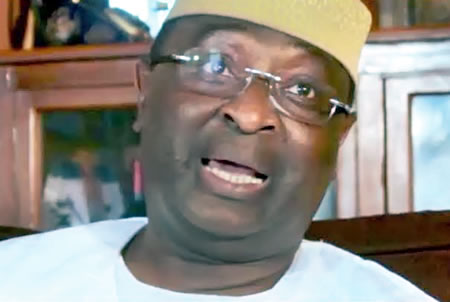Senator Tolu Odebiyi, the vice chairman of the Senate Committee on the Federal Capital Territory (FCT), in this interview by OSARETIN OSADEBAMWEN, speaks on Nigeria’s unemployment and kind of interface required by the Federal Government and the private sector to resolve the crisis.
As a lawmaker, you should be extremely disturbed by the frightening rise in the rate of unemployment in the country. How would you analysis the crisis?
Yes, one of the major concerns for me is that we keep doing the same thing over and over again and we do not seem to have found a solution to our problem. One of my greatest concerns is the fact that our population is growing at a very fast rate. A population that is growing at 2.7 per cent annually is doing so at about 5 million people annually. We cannot sustain this. I am reading that we have about 90 million people in poverty and unemployment is about 45 per cent right now. This is worrisome. For me, one of the things we should start looking at is to create economic zones that government will provide and subsidise the infrastructure; create the enabling environment for people to come and set up shops there.Even if it is going to be at a really subsidised rate, what we are trying to do is to mop up the unemployment gap. These operations will initially not be generating the kind of revenues we may want to be generated there but if industries come there, they will be able to mop up the unemployment gap. It will be an added benefit to the country.
We need to start focusing on the productive aspect of the economy. We are already investing in agriculture. That is good. Our youth population is rising and the youths are very versatile, so we need to also invest in technology parks, fibre optics and embedded power plants in the areas. Industries will come, hook up and start producing something. These are the things we want to see and we need to have them around.It is obvious that we may not be able to take care of our all infrastructural deficit at once. In view of our challenges and aspirations to cover the gaps, if we have targeted productive areas we are focusing on for now, and we are providing them with all infrastructure to work, that can also come in and help us a great deal. So, all the enterprise zones are good ways to go if it is well-planned and implemented to meet the objective, which is to manufacture produce and create employment for our citizenry.
You have argued that we may not be able to meet our infrastructural deficit at one time but could leverage on private funds. How possible is this?
If I have the opportunity, one of the things I have in mind is that the government has to think about getting out of capital project; it leave it for the private sector. Why is the government doing rail; why not privatise the rail? If we do not have the funds, why not let the private sector build it?In the United States, Rockefellers started the whole rail thing in America. A Dangote can do the rail; a foreign company can come in and say they want to do the rail and they will make money out of it. The population is there.The limited money that we have we put it into the areas that can work for education and health. On infrastructure, if China wants to give us money, we should say that instead of giving us money, come and do rail for us and you run it. Let them handle the capital projects; let us, as a government, lessen our involvement of capital projects and let the private sector come and handle it. All the government should do is to create the enabling environment for them.
The government has refused to allow remedial measures on the road to Ajaokuta by motorists plying the road linking the ceramic plants. What do you think about the issue?
We should look at our own policy to see if it is self-inflicting. You are talking about Ajaokuta, come to Agbara in Ogun State, it has the same problem. For me, it is a painful episode when I see the quality of companies there: NESTLE, P&G and all the top companies in this country. The global credit ratings of these companies are, in some cases, better than ours as a country. On the roads in the area, trailers are falling; those with containers are falling off them on that road. It is pathetic. All these have caused the underperformance for these operations.Most of the companies in the country are working at 30 to 35 per cent capacity and efficiency. They are underperforming because most of the infrastructure are not available for them. That, in itself, creates unemployment, because I cannot employ if the infrastructure is not there. If I cannot move my products, I cannot employ more workers to produce much. I am compelled to limit my production to meet the safe passage and delivery because of bad infrastructure.However, if these companies are producing at 90 per cent capacity and the roads are there and electricity is there, they can hire more people to produce. They can even work for 24 hours of the day.The absence of critical infrastructure hampers their productive capacity and I call on the government to look at our policy. We need to liberalise the capital projects. When you take a look at all the projects that the government has to execute, I really do not see how the government alone can undertake them. They are massive. The infrastructural deficit is too much, it is the problem that I see, is what I think we just say, you know what, you want to do a rail between Lagos and Ibadan, you are given the right of way and all other incentive government can offer to make the construction possible within short time. The president was in Russia and they said the Russians want to build rail. Okay! Let us show them what we have: we have the human capital; we have the population, we have the minerals and whatever. If you want to come here and make money and do whatever will improve our infrastructure, do it, so that we conserve money from spending them on infrastructure and use them to fund education, health and technology, areas that can really help us to move up.
Knowing that agriculture has a huge potential to absorb both skilled and unskilled persons, do you think the ongoing budgeting process offer any opportunity to address the situation?
This is not what can be addressed in one fell swoop. The budget process has started and we are already in the middle of it. It started with President Muhammadu Buhari presenting it to the joint session of the National Assembly, albeit with some challenges to it.Obviously, you can see that we have issues of revenue which is a major challenge.The president is trying to do so much; he wants to tackle infrastructure; he wants to resolved the issue of insecurity but obviously, the revenue is also a challenge and we cannot do this alone. How do we open up our markets to the private sector people and expand industries? That is what we should be thinking about. What I find ironic is that I have a lot of friends in the private sector, who want to do jobs. They have access to money; they know the EXIM banks. They know all these foreign creditors and where they can get resources. They thrive on running around looking for projects. Why don’t we create an area for them; to let them start racking their brains and looking at how they can come up with good projects. We just have to come up with very strict guidelines and compliance level that you have to meet.If you look at the private sector, a lot of the power plants were given out to people without capacity. A lot of them were looking at the monetary side of it, and not at the capacity and implementation of the power supply side. They were only thinking that ‘let me buy this GENCO; let me buy all these thing and all the money will be coming to me at the end of the month. They have now realised that they could not meet up to the demand of the sector in terms of capital outlay. They have realised that beside the initial capital, a lot of investments are needed to be met;that a lot of money will still be needed to be expended on power. They realised that they have nowhere to go, even thoughthe collection of revenue is another tasking job they have to do. So, for anybody that really wants to do the job, it is a sector that can be very profitable. Obviously, the current people in the sector that are trying to do it are struggling. They do not seem to have the capacity and at some point, they will have to look at the whole power sector again. Honestly speaking, the power sector has not worked as we anticipated as a nation.






